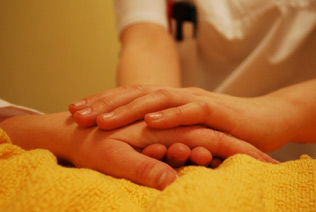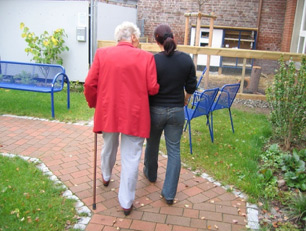When we are ill or injured (temporarily, semi-permanently, or permanently), not only are our bodies impacted but so are our lives. Changes in our abilities to function day to day (e.g. tying our shoes, walking long distances, working full-time, or a myriad of other possibilities) means that we often are required to turn to those around us to support us. This is not always an easy shift–especially if the changes in our lives are significant or long-term. The way that our relationships operate can change during these times and it may be stressful as a “new normal” is established between two people.
 People in a “caregivee” role can sometimes feel guilty for asking for additional support, acknowledging the changes that they need to make which could impact a person in a “caregiver” role, and may be prone to making additional physical sacrifices rather than “burden” their loved ones. It may also be challenging to ask for help and recognize that things we used to be able to do, we can no longer do, or must do differently. Compounding this could be the actual impact of the physical condition which could include pain, feeling ill, or reduced mobility.
People in a “caregivee” role can sometimes feel guilty for asking for additional support, acknowledging the changes that they need to make which could impact a person in a “caregiver” role, and may be prone to making additional physical sacrifices rather than “burden” their loved ones. It may also be challenging to ask for help and recognize that things we used to be able to do, we can no longer do, or must do differently. Compounding this could be the actual impact of the physical condition which could include pain, feeling ill, or reduced mobility.
Even though these challenges are common, there are strategies you may want to consider to mitigate the impact:
Access support for your mental and physical health.
Continue to access the professionals that will assist with your physical condition as well as maintaining other aspects of your physical health. Focus on the basics of activity, eating well, and sleeping. If you’re feeling a high level of stress, you may also want to consider supports for your mental health including friends, family, a counsellor, a spiritual community, and/or a support group. Consider being compassionate with yourself without getting lost and stuck in the feelings that might come with your current situation. Check out: http://www.selfcompassion.org/
Remember that asking for help comes from a place of strength.
It’s not easy to ask for help. We are often receiving messages that we “should” be able to figure things out on our own and that being independent is “best”. However, being able to recognize our needs and advocate for them is both effective and responsible. We can request support without losing our dignity by recognizing that this is an act of responsibility rather than weakness.
Shape your “new normal” with your thoughts and perspective.
When things change, we can either feel powerless or we can focus on the aspects of our lives we can control. We can set out to focus on what “could have been” or manage “what is”. Take charge of how you are thinking about your situation and then follow through on the steps that will help you feel more comfortable within the parameters you are dealing with. Check out https://www.ted.com/talks/carol_dweck_the_power_of_believing_that_you_can_improve”>this TED Talk on managing how you are thinking about a situation.
 When someone in our lives is managing a change in functionality due to a physical condition, we are rarely immune to these changes. The impact on us might be small (e.g. changing where the dishes are stored in the cupboard so a partner with shoulder pain can reach it unassisted) or large (e.g. having to change retirement plans or move to a different home). Impacts might be infrequent or chronic/time-consuming and can have a significant impact on the dynamic between people (e.g. what once was two very independent people might be transitioned into more of a caregiver/caregivee relationship).
When someone in our lives is managing a change in functionality due to a physical condition, we are rarely immune to these changes. The impact on us might be small (e.g. changing where the dishes are stored in the cupboard so a partner with shoulder pain can reach it unassisted) or large (e.g. having to change retirement plans or move to a different home). Impacts might be infrequent or chronic/time-consuming and can have a significant impact on the dynamic between people (e.g. what once was two very independent people might be transitioned into more of a caregiver/caregivee relationship).
Other common impacts include financial strain due to changes in employment, sleep and physical health deterioration, and strained social support. It is typical to have a significant reaction to these changes, and it is common to feel drained, sad, frustrated, and even depressed or angry.
It is important to recognize that as the partner/loved one of someone who has physical conditions impacting their life, it is very common that you will experience changes in your life. Often, people feel that they do not need support themselves because it is their job/role to support the person with the physical condition. However, it is so important that you stay healthy and supported so that you can continue in that role. Here are some things to consider that might be helpful in your role as caregiver:
Learn about the condition your loved one has.
Whether it’s cancer, chronic pain, a frozen shoulder, or tendonitis, it can be helpful to know what your loved one might be experiencing as well as what their needs might be. Search out reputable websites or talk to the specialists your loved one is working with to get to know what is involved.
Consider your own needs.
It is not selfish to recognize that your needs will change in this new/different role. In order to function well as a caregiver, you must support yourself and balance the extra energy it will take to make changes in your life or put more time/energy into caring for your loved one. Make sure you are sleeping, eating, and socializing. Take breaks for yourself even if this means accessing respite care or having a friend or family member help out for a few hours. And though people often do not think of it, accessing counselling for yourself as a caregiver is very appropriate and can be very effective.
Support groups.
Very rarely are people excited when I suggest support groups. However, they often provide a unique opportunity to feel surrounded by others that “get it” and can relate to what you are saying! It reduces the feeling of being on your own and can be a source of emotional support and good ideas.
 Being either a caregiver or cargivee can bring unique challenges. The changes that physical conditions bring to people can impact many aspects of our lives and require us to change our routines, plans, and expectations. However, remember that if both parties can manage the impact it has on them as an individual, chances are that you can come together to create a stronger unit moving forward. Remember to be kind and respectful to yourself, the other, and give yourself the best chance of thriving moving forward.
Being either a caregiver or cargivee can bring unique challenges. The changes that physical conditions bring to people can impact many aspects of our lives and require us to change our routines, plans, and expectations. However, remember that if both parties can manage the impact it has on them as an individual, chances are that you can come together to create a stronger unit moving forward. Remember to be kind and respectful to yourself, the other, and give yourself the best chance of thriving moving forward.
